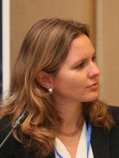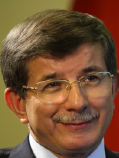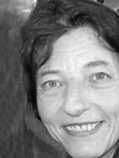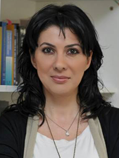 |
|
|
 Diba Nigâr Göksel |
|
“On the occasion of the centennial of the onset of World War I, in this issue of TPQ, we explore historical legacies in Turkey and across its neighborhood. In doing so, we reflect on the effects of history on current politics of identity and on geostrategic alignments in the region.
Focusing on key dynamics taking place in Turkey and its neighborhood, particularly in the post-Ottoman geography, we trace the role of collective memories and narratives in fueling both ethnic and religious prejudices. With a constructive and future-oriented outlook, we aim to highlight lessons learned from past experiences and to identify inclusive models of citizenship and leadership that can bridge existing divides.”

|
|
|
| |
 |
|
|
 Ahmet Davutoğlu |
|
“The Ottoman order did not suppress Armenian identity; on the contrary it guaranteed its existence by including it in the melting pot and integrating it within official structures.”
“When a retrospective understanding of history centered upon the relocation is adopted, the emergence of two collective understandings that despise one another is inevitable.”
“We view all of the communities that emigrated from Anatolia as our diaspora, not just the Turks living abroad.”

|
|
|
| |
 |
|
|
 Einat Wilf |
|
“Those looking to relate the ‘Arab Spring’ to the European ‘Spring of Nations’ should have known that the European Spring, in its immediate aftermath, was a complete failure.”
“The identities created during the century between the breakup of the Ottoman Empire and the Arab Spring cannot be written off easily.”
“It is no accident that the top mid-sized regional powers which have not had a history of being subject to the Ottoman Empire –Turkey, Iran, and Israel– are those that enjoy the most distinct sense of national identity.”

|
|
|
| |
 |
|
|
 Egidijus Vareikis |
|
“Almost all the present conflicts in the world are of a cultural nature, i.e. they are fueled by religious, historical, and ethnic misunderstandings.”
“The conflicts in the region of states formerly ruled by communists are far from resolution largely because instruments of cultural diplomacy are used incorrectly, sometimes deepening conflicts rather than solving them.”
“Far from being a minor factor as the communists had thought, religion became a decisive factor in the former Yugoslavia and some areas of the former USSR.”

|
|
|
| |
 |
|
|
 Mô Bleeker |
|
“One of the usual consequences of fact-finding is the transformation of the perceptions, narratives, and attitudes towards the ‘other,’ ‘enemy,’ victim, or perpetrator so that they are not viewed as a compact and homogeneous group.”
“The creation of a historical commission is a true test of the quality of democracy.”
“Victims often express their feeling that ‘justice has been done’ when the circumstances and facts that led to the commission of atrocities have been established.”

|
|
|
| |
 |
|
|
 İlter Turan |
|
“Ottoman defeat in the First World War led to the adoption of a more modest, territorially-based nationalism in the lands that remained in Turkish hands.”
“In contrast to Sèvres, in which the defeated Ottoman State had yielded to the dictates of the Allies, Lausanne was a product of negotiations between parties, not a unilateral imposition.”
“The Turkish government’s drive for ethnic homogenization has been one of the potent stimuli that has instigated Kurdish reactions, particularly in recent times.”

|
|
|
| |
 |
|
|
 Cengiz Aktar |
|
“Unable to talk about massacred Armenians, the survivors who had to convert to Islam to stay alive and those who were saved and Islamized by force were also disregarded.”
“Are we at the dawn of the construction of a new language for the genocide, a language that would include more than the direct victims and thus pave the way to a shared memory?”
“Between a segment of diaspora Armenians and their Turkish counterparts, a mutual discovery process is underway, since both, being from similar intellectual backgrounds, speak very much the same language.”

|
|
|
| |
 |
|
|
 Alexandros Massavetas |
|
“Ottoman Greeks, like all Ottoman minorities, initially greeted the 1908 coup by the CUP and its promises of equality and constitutional government with enthusiasm.”
“Apportion of blame to third parties has become a topos in Greek literature, which –just like its Turkish counterpart– is obsessed with an often stale and unoriginal ‘anti-imperialist’ rhetoric.”

|
|
|
| |
 |
|
|

Nefin Dinç |
|
“Not knowing what the ‘other’ is thinking about us hampers our ability to hear each other and perhaps realize how stereotypes and resultant ill feelings about the ‘other’ are constructed on both sides.”
“Recognizing the problem is the first step toward improving conditions, and in our film The Other Town we presented a picture of how the shared history is taught in both countries.”

|
|
|
| |
 |
|
|
 Laki Vingas |
|
“The institution of vakıf, although derived from the Islamic tradition, adapted to the social standards of the time to cover the needs of non-Muslim communities for social benefits to their members.”
“Turkey –after decades of adverse experiences– proclaims that it wants a constitution based on universal human values and liberal principles.”

|
|
|
| |
 |
|
|

Richard C. Hall |
|
“The millet system permitted the growth and coexistence of diverse ethnic communities under Ottoman authority throughout the Balkans.”
“First the Serbs, then the Greeks and Romanians, and finally the Bulgarians struggled against Ottoman authority to realize nation-states.”

|
|
|
| |
 |
|
|

Maya Arakon |
|
“The Young Turk Revolution of 1908 replaced Sultan Abdülhamid II’s Islamic vision with secularism and constitutionalism, and an atmosphere of liberalism began to reign in the country.”
“It would not be incorrect to state that the Kurdish demands of the last century do not differ significantly from those of today.”

|
|
|
| |
 |
|
|

Nil Mutluer |
|
“Even though the historical memories Alevis recall and relate are diverse, what they have in common is that they all suffered under centralization policies.”
“Instead of admitting injustices committed and offering apologies and compensation, the government continues to exclude Alevis.”

|
|
|
| |
 |
|
|

Deniz Sert |
|
“The policy response to the refugee crises during the wars in Bosnia and Kosovo resembled neither the hesitant reaction towards the Kurdish refugees, nor the welcoming attitude towards the flows from Bulgaria.”
“Turkish society is showing an incredible social and political resilience towards the [Syrian refugee] issue, which would normally cause a moral panic in most other European countries.”

|
|
|
| |
 |
|
|

Kenan Çelik |
|
“Unlike many historically significant sites of the world that are considered contested ground, Gallipoli has become a site of pilgrimage and a place of pacific conciliation.”

|
|
|
| |
 |
|
|

Orkhan Gafarli |
|
“Another issue weakening the influence of the Circassian diaspora on Turkish policymaking towards the region is that their position regarding Russia embodies a duality. While many have supported Russian-Turkish cooperation when it comes to Abkhazia, others focus on the historical wrongdoings Moscow has committed against their nations.”

|
|
|
| |
 |
|
|

Alida Vracic |
|
“Historically, Bosniaks consider the Ottoman era of their history as the ‘Golden Age’ of BiH, and see it as the birth of their religious identity. BiH’s Christian populations of Serbs and Croats, in contrast, deem the Ottoman period as a time of enslavement and tragedy that lasted for more than four centuries.”

|
|
|
| |
|
Premium Corporate Sponsor of this Issue
|
| |
 |
|
Thanks to our Partners
|
| |
 
|
|
Address: Kadir Has Üniversitesi Cibali Kampüsü Sosyal Sorumluluk Binası ( Beyaz Ev )
Küçük Mustafa Paşa Mah. Seferikoz Sok. No:14 Kat.1 Fatih- İstanbul
Phone: +90 212 621 4442 - +90 212 621 9258 Fax: +90 212 531 8718 info@turkishpolicy.com
|
|



